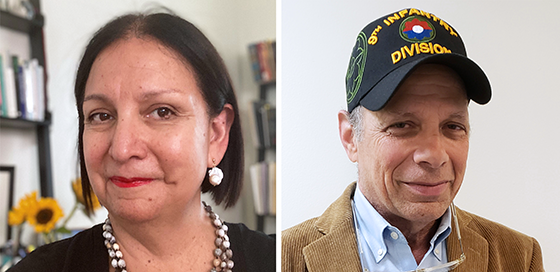Ovations
Luz Martin del Campo and Richard Legum Join the Newest Cohort of CUNY Career Success Fellows
For the past two years, 15 faculty CUNY Career Success Fellows (CCSF) have been pioneering effective and easy methods of helping students understand the relationship between classroom learning and careers that can be adapted to every field. The “Careers Across the Disciplines” initiative was launched several years ago by CUNY’s Office of Transformation, in partnership with the Office of Careers & Industry Partnerships. Earlier this year, a call went out to recruit 50 additional fellows to build on this work. Dr. Luz Martin del Campo and Dr. Richard Legum, Kingsborough professors of anthropology and philosophy, were recently selected to join the newest CCSF cohort.
The initiative aims to ensure students understand how what they learn in the classrooms fits into the National Association of Colleges and Employers’ (NACE) eight competencies employers look for when hiring. They include critical thinking/problem solving; teamwork and collaboration; professionalism/ work ethic; oral and written communication; career and self-development; equity and inclusion; leadership; and technology.
A member of the inaugural group of fellows, Dr. Midori Yamamura of KCC’s art department, found that wasn’t enough to correlate how each assignment in her art history syllabus fit the NACE job competencies criteria. In collaboration with Marisa Joseph, director of Kingsborough’s Center for Career Development & Experimental Learning, each of Yamamura’s students were assigned to book an appointment with a career coach and reflect on their experience on paper. “This turned out to be quite effective,” she reported. “Visiting the career center seems to have heightened their motivation for learning. All the students completed the career assignments and gave positive feedback in their written reflections.” Many of her students reported they were unaware of the service and now had a clearer sense of their career goals after meeting with a career coach. “We academicians tend to think focusing on our field is most important. However, igniting motivation in students can transform their attitudes toward learning and inspire curiosities. Curiosity and self-development are important qualities employers look for in their employees,” she added.
Martin del Campo incorporates the five competencies she learned as a Land Use Environmental Change Institute (LUECI) Fellow at the University of Florida in Gainesville, where she earned her Ph.D. in anthropology, into her “Introduction to Anthropology” courses: cultural awareness, critical thinking, communication, creativity, and collaboration. “These skills are the pillars of work attainment according to the International Labour Organization in Geneva, Switzerland,” she explained. “Before classes start, I get in touch with the students and ask questions that allow me to see the individual and collective strengths and resilience of each and every student. Students learn to incorporate an anthropological lens in their academic disciplines and career aspirations. What follows is the engagement of students in seeing the connectivity of all five competencies in real-time issues and events.“
As a Career Success fellow, Martin del Campo would like to explore more ways to tie her curriculum to careers. “Unifying ideas with real-world career experiences through the participatory syllabus development in class with students' input, design-based projects, curricula development, reimagining mentoring in class, and hearing from KCC alumni and experts on how they align their academic experiences to their present careers would enable students to experience connectivity between learning and career readiness.”
Legum benefited from a program illustrating those connections. “After receiving my Ph.D. in philosophy, I taught at the College of Charleston, served as a U.S. Army Infantry Officer, and returned to teach at RIT. Then I was confronted with a "what's next?" decision,” he shared. After attending a program at the NYU School of Business for Ph.D.'s preparing for careers in business, he embarked on a 28-year career in information technology. He wants to share the lessons he learned of the critical skills and knowledge a liberal arts education provides with his students to help them find, develop, and succeed in careers.
Legum feels faculty should rethink the learning outcomes of their courses and map them to skills in demand in the workplace, placing the focus on the practical value of a college education. Within his department, he’s done that with the ethics courses he teaches. “I developed two philosophy courses that explore the application of ethics to practical problems: PHI 6600 | Criminal Justice Ethics and PHI 6800 | Ethical Problems in Business and Society (Business Ethics). For example, in Business Ethics, we discuss moral dilemmas concerning insider trading. In Criminal Justice Ethics, we examine the discretion that police officers must exercise in keeping the peace, the dilemma in carrying out their daily duties, and ethical lapses that have led to corruption scandals in the NYPD. While processing various ethical dilemmas, students are learning about different careers in these fields.”
Martin del Campo also opens her students’ eyes to career possibilities. “We cover evolution and human origins as part of our four-field approach in Introduction to Anthropology. One biology student, who wrote an honor’s research paper on the impact of the Neanderthal chromosome 3-gene as a risk factor in Covid-19 and the protection of having a Neanderthal chromosome 12-gene against severe Covid-19, shared with my current anthropology students: ‘I never knew anthropology connected to biology.’”
The new Career Success Fellows will expand upon and complement an array of impactful faculty professional development programs designed to support the integration of career aspirations and preparation into the classroom, including the CUNY STEM Pedagogy Institute and the NY Jobs CEO Council Faculty Fellowship.
In addition to participating in professional development designed to share the best methods for helping faculty integrate career-related goals, content, and preparation into the classroom, they will be actively engaged as campus leaders and cross-CUNY liaisons, including spearheading local events, from spring 2023 through June 2024.

